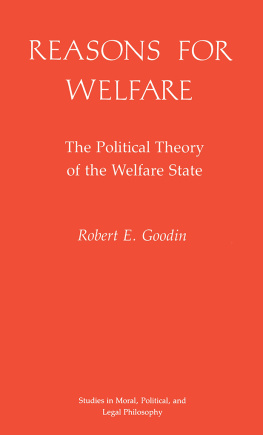First published in 1967 by
Routledge
Reprinted in 1998, 2001 by
Routledge
2 Park Square, Milton Park, Abingdon, Oxon OX14 4RN
Transferred to Digital Printing 2007
Routledge is an imprint of the Taylor & Francis Group
1967 Peter Nokes
All rights reserved. No part of this book may be reprinted or reproduced or utilized in any form or by any electronic, mechanical, or other means, now known or hereafter invented, including photocopying and recording, or in any information storage or retrieval system, without permission in writing from the publishers.
The publishers have made every effort to contact authors/copyright holders of the works reprinted in The International Library of Sociology.
This has not been possible in every case, however, and we would welcome correspondence from those individuals/companies we have been unable to trace.
British Library Cataloguing in Publication Data
A CIP catalogue record for this book
is available from the British Library
The Professional Task in Welfare Practice
ISBN 0-415-17720-0
Public Policy, Welfare and Social Work: 18 Volumes
ISBN 0-415-17831-2
The International Library of Sociology: 274 Volumes
ISBN 0-415-17838-X
Publisher's Note
The publisher has gone to great lengths to ensure the quality of this
reprint but points out that some imperfections in the original
may be apparent
This book is concerned with the nature of the professional task in such occupations as schoolteaching, mental hospital psychiatry and prison and borstal work. These occupations, and others, I refer to as the welfare professions.
The welfare professions can be defined as those occupations where the declared purpose is to ameliorate the lives of other people, and to care for them, but where this purpose is accomplished by means that to the onlooker do not appear markedly different from those of ordinary social intercourse. These professions do not possess much in the way of a technology. Surgery and medicine are therefore almost entirely excluded from this category, as although their declared purposes are those of the welfare professions their interventions typically take place via surgical operations and the administration of drugs. They can be included to the extent that the influence of intangibles (ward atmosphere, morale) on a patient's career is acknowledged, as in psychosomatic medicine. Apart from this they do not come into the analysis. Psychiatry on the other hand is included in the category insofar as it uses varieties of psychotherapy, work therapy, milieu therapy and the like, but is excluded to the extent that it relies on drugs, chemotherapy, electroconvulsive therapy and similar resources. Occupations central to the category are the professions of education, including remedial and special education, and correctional work in prisons, borstals and approved schools.
The category of welfare profession ought, on this basis to include all forms of social work. This is so. I have nevertheless focused discussion on those occupations that are conducted in an institutional setting such as a school, or a psychiatric hospital, or a borstal. One reason for this restriction is that the nature of the task in the one-to-one relationships of casework and individual psychotherapy is already the subject of an extensive literature, the most recent significant contribution being Professor Halmos's study of counselling. It is not suggested that institutional work is of an ultimately different nature from work carried on outside an institution. It is rather that the practice of the welfare professions within an institution forces attention to aspects of professional activity that can otherwise be ignored, and in published discussion often are ignored, owing to the greater ease with which the demands of the social environment can themselves be ignored or otherwise discounted.
Thus the theme of the book as baldly stated in the first paragraph can already be clothed in some meaning. To explore the nature of the professional task in the welfare professions is to explore, among other things, the relationship between activities designed to supply the needs of individual clients, and activities designed to supply the needs of the organization and of the society within which the client's needs are met. What is the relationship between the casework and the administrative elements in school teaching, in borstal housemastering, in mental hospital psychiatry and in the custodial care of the offender? This question itself can be split into two. On the one hand we can ask what is the observed relationship between these considerations; to what extent are they in conflict, and when they are in conflict how are these conflicts resolved and decisions made? And on the other hand we can ask what is the proper relationship between them, i.e. what should be the strategy of the welfare professions?
The question: What is the nature of the task in the welfare professions? has other dimensions too. It is, for example, posed by any examination of what we understand by the term treatment in those organizations such as borstals and special schools that are not part of the medical world, where none of the distinctively medical forms of intervention are to be found, but where the term treatment is in fact used to describe professional activity. What, in such settings, is the difference between a treatment relationship and a social relationship? How far is a treatment relationship defined by the presence of a distinctive technology (as in surgery or medicine), and in the absence of such a technology what is the significance of the fact that we still define some varieties of social relationship as treatment relationships and others as not? What in turn does this tell us about preferred modes of social interaction? How far is the treatment role sought because of the social distance it confers on the treatment giver, and how far is this an appropriate mode of social interaction in the welfare professions?
It is in connection with these problems that the question what is the nature of the task? arises on courses of training. Students training to be assistant governors in the prison and borstal service, or to be teachers, or to be psychiatrists, have to arrive at some notion of what their chosen occupation is about, what their own contribution is to be and how they are to act. Are they to see themselves as adjusters, as behavioural engineers practising skills of a kind analogous to those of the surgeon? Graduate entrants to the prison and borstal services seem often to expect this kind of role and the role of doctors in society at large encourages perhaps most trainee psychiatrists to see themselves acting in this way. Or are they on the other hand engaged in an activity that is of a kind not essentially different from the conduct of ordinary social relationships except insofar as it is more conscious, and conceptualized in terms of a richer and more sophisticated theoretical framework? And if the latter then in what sense can they, ought they, need they regard themselves as professionals? These problems (which occur to psychiatrists as well as to borstal housemasters and teachers) are real problems, they face everyone embarking on a career in the welfare professions, and it is the task of a training course to bring them into consciousness.
I have therefore tried to root discussion in the problems of the practitioner and the practitioner to be. My working life is spent in contact, not with undergraduate students of the social sciences who might be examining the worlds of penology and education as a preparation for a degree, but with people who are going to act as assistant governors, and teachers, and psychiatrists, and whose needs are therefore of an entirely different nature. My professional concerns are with problems of practice; so also are my theoretical interests. Hence the discussion is not of what the welfare professional ideally ought to be doing in some perfectly rational society whatever that might mean but of the task as it presents itself daily. The most easily overlooked question in any discussion of education, or correctional work, or even of psychiatry, is what the practitioner actually does, what is the significance of what he does, what he thinks he is doing and what is the significance of any myths he may create about what he is doing. These are the kinds of question the book sets out to explore.






